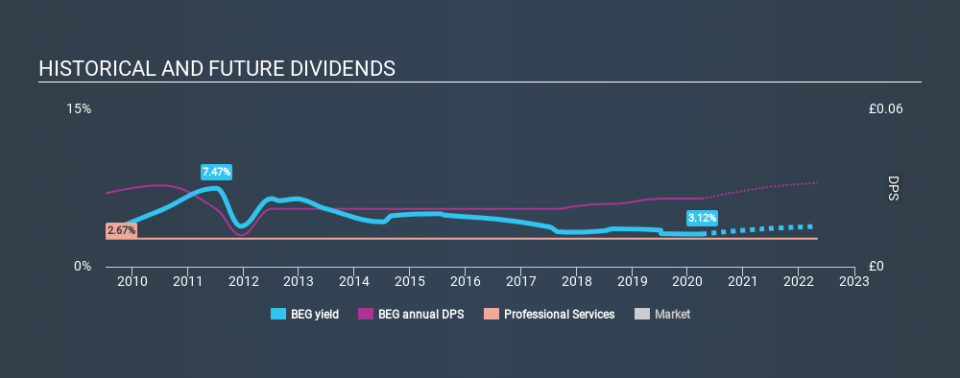Begbies Traynor Group plc (LON:BEG) Goes Ex-Dividend In 3 Days

Readers hoping to buy Begbies Traynor Group plc (LON:BEG) for its dividend will need to make their move shortly, as the stock is about to trade ex-dividend. Ex-dividend means that investors that purchase the stock on or after the 9th of April will not receive this dividend, which will be paid on the 11th of May.
Begbies Traynor Group's next dividend payment will be UK£0.009 per share, and in the last 12 months, the company paid a total of UK£0.026 per share. Last year's total dividend payments show that Begbies Traynor Group has a trailing yield of 3.1% on the current share price of £0.834. Dividends are a major contributor to investment returns for long term holders, but only if the dividend continues to be paid. We need to see whether the dividend is covered by earnings and if it's growing.
View our latest analysis for Begbies Traynor Group
If a company pays out more in dividends than it earned, then the dividend might become unsustainable - hardly an ideal situation. Its dividend payout ratio is 85% of profit, which means the company is paying out a majority of its earnings. The relatively limited profit reinvestment could slow the rate of future earnings growth. We'd be worried about the risk of a drop in earnings. That said, even highly profitable companies sometimes might not generate enough cash to pay the dividend, which is why we should always check if the dividend is covered by cash flow. It distributed 37% of its free cash flow as dividends, a comfortable payout level for most companies.
It's positive to see that Begbies Traynor Group's dividend is covered by both profits and cash flow, since this is generally a sign that the dividend is sustainable, and a lower payout ratio usually suggests a greater margin of safety before the dividend gets cut.
Click here to see the company's payout ratio, plus analyst estimates of its future dividends.
Have Earnings And Dividends Been Growing?
Businesses with shrinking earnings are tricky from a dividend perspective. If earnings decline and the company is forced to cut its dividend, investors could watch the value of their investment go up in smoke. That's why it's not ideal to see Begbies Traynor Group's earnings per share have been shrinking at 3.1% a year over the previous five years.
Begbies Traynor Group also issued more than 5% of its market cap in new stock during the past year, which we feel is likely to hurt its dividend prospects in the long run. It's hard to grow dividends per share when a company keeps creating new shares.
Another key way to measure a company's dividend prospects is by measuring its historical rate of dividend growth. Begbies Traynor Group's dividend payments per share have declined at 0.7% per year on average over the past ten years, which is uninspiring.
Final Takeaway
Should investors buy Begbies Traynor Group for the upcoming dividend? We're not enthused by the declining earnings per share, although at least the company's payout ratio is within a reasonable range, meaning it may not be at imminent risk of a dividend cut. To summarise, Begbies Traynor Group looks okay on this analysis, although it doesn't appear a stand-out opportunity.
With that being said, if dividends aren't your biggest concern with Begbies Traynor Group, you should know about the other risks facing this business. In terms of investment risks, we've identified 3 warning signs with Begbies Traynor Group and understanding them should be part of your investment process.
If you're in the market for dividend stocks, we recommend checking our list of top dividend stocks with a greater than 2% yield and an upcoming dividend.
If you spot an error that warrants correction, please contact the editor at editorial-team@simplywallst.com. This article by Simply Wall St is general in nature. It does not constitute a recommendation to buy or sell any stock, and does not take account of your objectives, or your financial situation. Simply Wall St has no position in the stocks mentioned.
We aim to bring you long-term focused research analysis driven by fundamental data. Note that our analysis may not factor in the latest price-sensitive company announcements or qualitative material. Thank you for reading.



